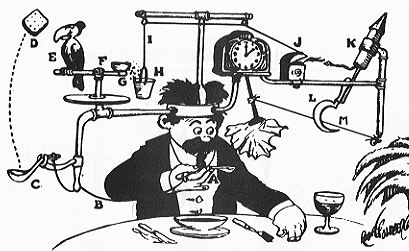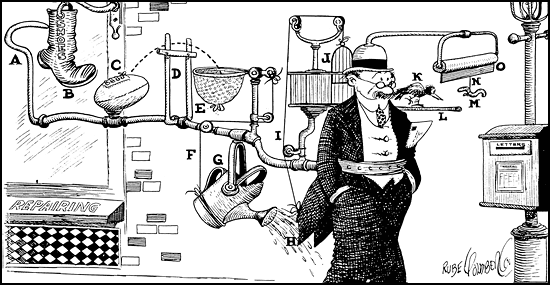It took decades longer than predicted in the 1954 Popular Mechanics article “Is the Automatic Factory Here?” for “electronic brains” to mature enough to replace human workers en masse in a concentrated time frame, but the day of reckoning is apparently finally here–and we’re still only at the beginning. The automated workplace’s eventual arrival was clear during the peace-dividend period in post-WWII America, with its bowling-ball return machines and device-driven assembly lines. The question is whether, as in the ’50s and ever since, new opportunities will arise to replace those disappeared by Weak AI. An excerpt:
Automatic brains and tools are even marching out of the shops and into the offices. A new electronic system for a Chicago mail-order firm gulps down catalogue orders as fast as 10 operators can press keys. In much less than a second, an operator can find out the total number of orders on file for a particular item. The machine does the work of 39,000 adding machines and much of the brain work of 40-odd girls who formerly classified and recorded the orders.
Dr. Simon Ramo, head of the Ramo-Woolridge Corporation and one the nation’s leading authorities on “synthetic intelligence” declares flatly: “It is possible for engineers today, on the basis of known science, to produce devices which could displace a very large fraction of the white-collar workers who are doing routine paperwork which can be reduced to simple thought processes.”
Today’s automatic machines with their electronic brains are the advance guard of a new army of workers. An appropriate word has popped into the language to describe these “synthetic” workers and thinkers, a word that likely will be as commonplace as the word electronics within five years. That word is automation.
Down-to-earth engineers, supervisors and even businessmen are becoming experts on automation. This is not a Rube Goldberg dream nor the zany Technocracy of the early ’30s, but a new Industrial Revolution, a revolution that is coming slowly but inevitably.
The first Industrial Revolution replaced man’s muscles with machinery. The new revolution, most automation experts firmly believe, will replace man’s routine brainwork with machines. Dr. Ramo says:
“Surely no one can deny that the replacing of man’s brains will effect some sort of revolution. The biggest factor in changing all business and industry must be the coming of the age of synthetic electronic intelligence.”•
Tags: Clifford B. Hicks, Dr. Simon Ramo


